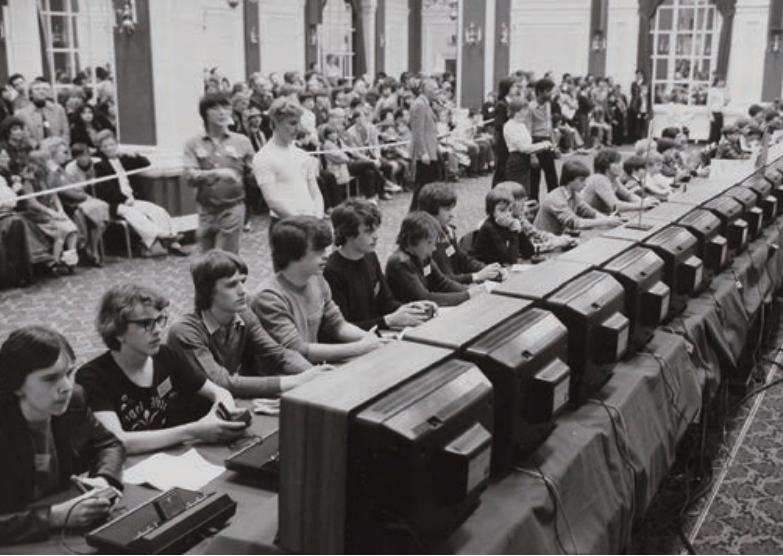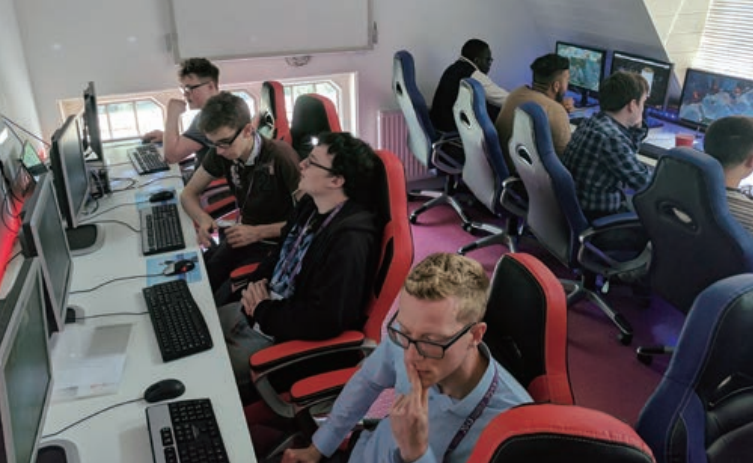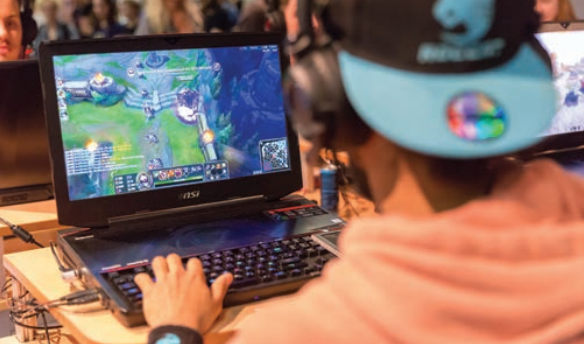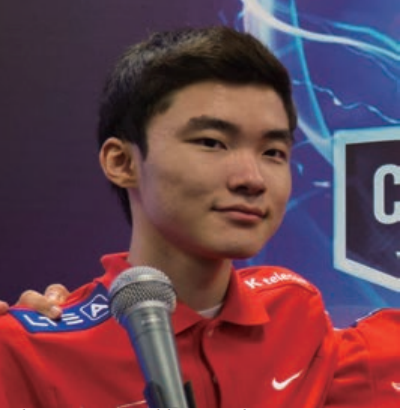There are many eSports tournaments taking place in October such as the League of Legends World Championship, which draws tens of millions of viewers worldwide. It is only recently that eSports has expanded into a global market, and some expect that it will surpass traditional sports in revenue and viewership. Therefore, the Sungkyun Times (SKT) now explores the history of eSports, examines recent market trends and growth potential, and handles the controversies surrounding the thriving eSports industry.
Keyboard Warriors
What Is eSports?
eSports is short for electronic sports. It refers to a system of events composed of competitive matches among amateur or professional athletes, who engage in multiplayer matches of video games using computers, video game consoles, or other gaming devices such as mobile phones. The scale of such events can vary widely, from Internet café gatherings with a few dozen people to stadium matches with tens of thousands of spectators. As eSports players depend more on mental faculties rather than physical strength, eSports is classified as mind sports like chess. Depending on which video game is played, critical skills can include strategic thinking, fast reflexes, mathematics, and the ability to rapidly manipulate input devices. In real-time video games as opposed to turn-based games, a player’s proficiency is measured by Actions per Minute (APM), which refers to the number of keyboard and mouse clicks per minute. Professional competitors can achieve a sustained 400 APM. While many people enjoy multiplayer games on their own, eSports is distinguished from regular gaming because it uses organized ranking and tournament systems. Events are organized by various organizations such as game developers and national eSports commissions. At the international level, the International e-Sports Federation (IeSF) oversees the coordination and standardization of eSports. Founded in 2008 in South Korea with nine countries including Denmark and the United States (US) participating, it has its headquarters in Seoul. Popular video games for professional eSports include Starcraft, League of Legends, Overwatch, and Playerunknown’s Battlegrounds.

An Abbreviated History of eSports
eSports had humble beginnings. The first video game competition was at Stanford University in 1972, when five people competed for an annual subscription to the Rolling Stone magazine, playing Spacewar, a video game of space combat. By the 1980s, video gaming had become common in the US. The Space Invaders Championship sponsored by the developer Atari was the first recorded sizable eSports tournament, having 10,000 participants. It was also held at Stanford University in 1980. It took a few decades before eSports became a mainstream form of entertainment, beginning in South Korea. The explosive popularity of Starcraft led to national tournaments and television stations being organized, for the first time in the world. Professional video gamers began forming teams in 1999; legendary players such as Lim Yo-hwan started playing Starcraft around then. By 2003, top-level players such as Lim were earning tens of thousands of dollars by being professional eSports competitors. The global popularity of multiplayer games continued to grow, and eSports tournaments started cropping up in Europe and the US. Moving forward to the 2010s, eSports has become a global industry with billions of dollars in revenue; it is no longer an obscure South Korean subculture. Star players have fan clubs with members across the world and millions of dollars in annual income. While eSports has long surpassed its Korean origins, Korean players have been dominating most eSports competitions and teams; it is common to find Korean teams in Europe and the US. In the span of just 20 years, eSports has become a phenomenon with tens of millions of followers from being underground competitions for nerds.
Under the Glitz
The rapid growth and partial mainstream acceptance of eSports mean that eSports has become susceptible to all the ills that plague traditional sports: corruption, abuse, and many aspiring eSports competitors who do not make it.
Unrequited Aspirations
Many young people see video gaming as a fun hobby. Furthermore, some people even seek to make a job of it, attending gaming cram schools or becoming a trainee under a team. The reality for trainees, however, can be harsh. While eSports has grown larger than ever, it is only a select few stars and teams that take in most of the The 1980 Space Invaders Tournament revenue, and job stability can be very low for those who do not have the skills to make it to the top. The players who find themselves out of a job can find employment as eSports commentators, coaches, and broadcast jockeys, but other positions in the industry are limited in number and just as unstable. Moreover, the training process is arduous and unhealthy. Players spend most of their time awake practicing gaming, which leads to an extreme amount of mouse and keyboard usage while sitting at a desk. This can lead to such issues as carpal tunnel syndrome (CTS), vision problems, and even herniated disks. Just as in physical sports, all this exercise leads to wear and tear on the body, and players are often forced to retire when their health cannot keep up anymore. In rare cases, the stress involved has led to death; Yeo Ui-joo, a professional Special Forces player, died in 2011 during his military service as a result of cerebral hemorrhage that was caused by coronary issues acquired during his eSports career. It is also easy to struggle economically as a trainee. Many teams tend to only provide food and lodging, and getting minimum wage income is common. As trainees are technically not employed by their teams, they have no obligations concerning the minimum wage. Even if they make it out of training, it is unfortunately common to never make it to the top as a competitor then to drop out of the industry after a few years of languishing in second-tier leagues.

Dishonor Before Defeat
Corruption has always been common in the sports industry, and eSports has increasingly started to resemble traditional sports in that respect. Major incidents involving match-fixing, drug abuse, and regulative inadequacy have been causing trouble for the industry. The most serious incident happened in Korea in 2010. A large cabal of players, managers, and commentators had conspired with illegal gambling organizations to make money by match-fixing and influenced the Korean Starcraft League (KSL). Combined with the reluctance of overseeing organizations to deal with the issue, the incident exploded into a fan outrage, severely impacting the eSports industry in Korea for years. Eight teams and the Munhwa Broadcasting Corporation (MBC) Game channel, were disbanded in the aftermath. KSL sputtered on for a few years and later disappeared. There have been similar incidents since then, and match-fixing continues to be an issue. Drug abuse is also common in eSports. Doping regulations are inconsistent between various international eSports organizations, which has led to many players illegally taking prescription stimulants or relaxants to sharpen their reflexes or to reduce pre-game anxiety. This is a major issue as using drugs without a prescription is illegal and unhealthy. Lack of formal recognition for the players to be seen as athletes is also hindering eSports players. For instsance, Marcel Feldkamp, a German professional League of Legends player, was traveling to Los Angeles via Washington D.C. for a tournament when he found himself detained by airport security. He was interrogated and then deported from the US, left stranded and unable to participate in his scheduled matches in the end. It is far harder for eSports professionals to be legally acknowledged as athletes compared to their peers in traditional sports, causing administrative problems when organizing large international events.
The Upcoming Golden Age of eSports
Enticing Prospects
Despite all of these issues, eSports has a very bright future ahead of it as a whole, and it is growing much faster than any other entertainment industry in the world due to several factors, one of which is its demographics. Video games are a recent invention, and in much of the world, it has not been long since access to the Internet has become common. There remain many countries where Internet penetration is low; all of which are potential markets. As people who grew up playing multiplayer games in the 1990s and beyond reach adulthood and maturity, their purchasing power will enable the rapid growth of eSports. The gaming industry is already a giant, with its annual revenue of $110 billion as of 2017 exceeding that of the movie industry, publishing, and music. Markets such as Southeast Asia, Africa, South Asia, and South America have been rapidly adopting computers and Internet services and will drive expansion for decades to come as economic growth and entertainment spending goes hand in hand. eSports also requires less infrastructure spending as no large stadiums or specialized venues are needed; all that is needed are computers and a fast local area network. Moreover, audience engagement through platforms such as Twitch, YouTube, and Facebook makes eSports more accessible than ever before, enabling them to reach audiences that they would not have been able to otherwise. If optimists are to be believed, eSports will soon have equal standing or become larger than traditional sports in general; while revenue for major sports events such as the Olympics or the World Cup has been stalling and even declining, eSports has a long way to go. The numbers seen today are certainly encouraging; the League of Legends World Championship Finals was watched by a total of 60 million people worldwide in 2017, a 39% growth from the previous year.
An eSports Gold Rush

Compared to the early days, eSports players of today have far more opportunities for true wealth. For example, Epic Games, an American video game developer, broke records by announcing that it will be contributing $100 million in prize pool money for Fortnite Tournaments in 2018, the largest sum ever for any single video game title in a given year. According to Statistia, an American statistics company, the eSports market has grown from $130 million to $960 million in the last six years, and it is estimated that the market will nearly double that by 2021. As eSports and its players become wealthier, additional ways of deriving revenue have been opening. Computer peripheral devices, advertisements, branding, and sponsorship deals have become common in the eSports industry. Manufacturers have been reporting rapid growth of products specifically designed for gaming, such as mice and keyboards as well as monitors, headsets, and networking equipment, many of which are now connected to popular competitors in personal branding initiatives. Examples include equipment named after the players’ nicknames. Top-of-the-line players such as Lee Sang-hyeok, also known as “Faker” in the League of Legends circle, have been receiving sponsorships from large companies such as SK Telecom. In particular, Lee appeared in several advertisements for Doritos, a brand of snack chips, in China.

Induction into the Cultural Mainstream
That eSports is culturally mainstream, even in Korea, might still be a contentious statement to make, but it is undoubtable that it has expanded outside of its small initial circle. Universities now host small amateur tournaments, and eSports has been a common fixture in school festivals at Sungkyunkwan University (SKKU); last year, the final tournament of a university-level Overwatch match was streamed live at the central stage on the Natural Sciences Campus with 350,000 at stake. In the 2018 Jakarta-Palembang Asian Games, eSports was featured as a demonstration sport, and the finals were broadcasted on Korean Broadcasting System (KBS) and Seoul Broadcasting System (SBS) for the very first time, leading to jubilation in Korea after an expected victory. In the 2022 Games, it is expected to be a proper part of the event, showing that eSports is now a force to be reckoned within sports. Even football clubs, such as Paris Saint-Germain have been showing interest in establishing an eSports team.
eSports has come a long way but is still an industry in its infancy that is expected continue to grow rapidly. Its impact potential on the entertainment business is not to be underestimated. There will perhaps even come a day when eSports is featured in international sports events such as the Olympic Games. For those Kingos who will be participating in eSports competitions or watching eSports as a fan, the SKT wishes them good luck on the battlefield.
